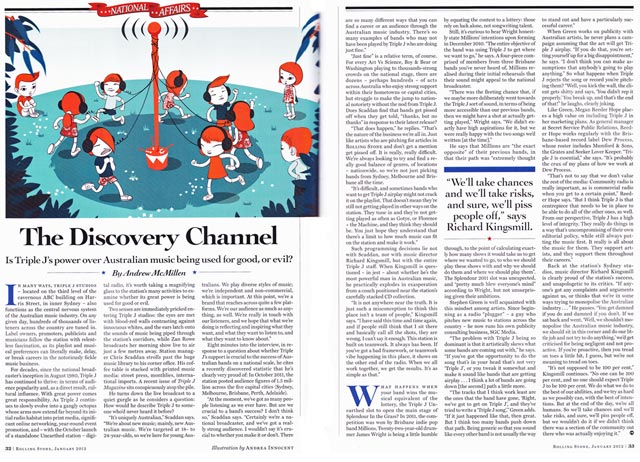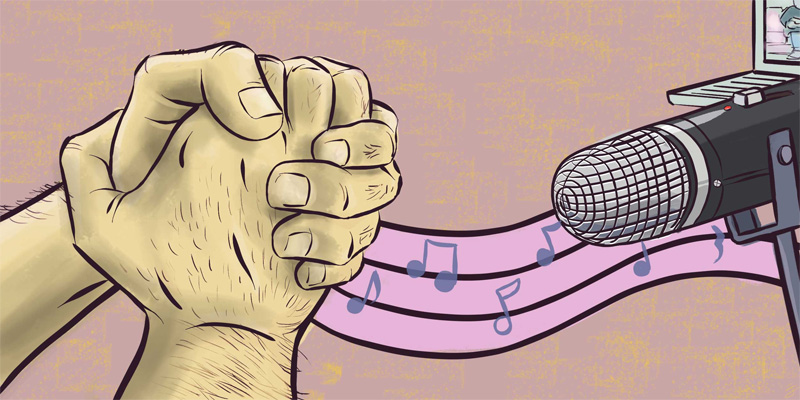A feature story published in the January 2012 issue of Rolling Stone Australia, under the ‘National Affairs’ banner.
Click the below image for a closer look, or read the article text underneath.
National Affairs: The Discovery Channel
Is triple j’s power over Australian music being used for good, or evil?
by Andrew McMillen. Illustration by Andrea Innocent

In many ways, triple j studios – located on the third level of the cavernous ABC building on Harris Street, in inner Sydney – also functions as the central nervous system of the Australian music industry. On any given day, hundreds of thousands of listeners across the country are tuned in. Label owners, promoters, publicists and musicians follow the station with relentless fascination, as its playlist and musical preferences can literally make, delay, or break careers in the notoriously fickle music business.
For decades, since the national broadcaster’s inception in August 1980, triple j has continued to grow: in terms of staff numbers, audience popularity and, as a direct result, cultural influence. With great power comes great responsibility. As triple j continues to slowly evolve into a gangly octopus whose arms now extend far beyond its initial radio habitat into print media, significant online networking, year-round event promotion, and – with the October launch of a standalone Unearthed station – digital radio, it’s worth taking a magnifying glass to the station’s many activities to examine whether their great power is being used for good or evil.
Two senses are immediately pricked entering triple j studios: the eyes are met with bloody red walls contrasting against innocuous whites, and the ears latch onto the sounds of triple j being piped through the station’s corridors, while Zan Rowe broadcasts her morning show live to air just a few metres away. Station manager Chris Scaddan strolls past their huge music library to his corner office. His coffee table is stacked with months’ worth of printed music media: street press, monthlies, international imports. A recent issue of triple j magazine sits conspicuously atop the pile.
He turns down the live broadcast to a quiet gurgle as he considers a question: how would he describe triple j to someone who’d never heard it before?
“It’s uniquely Australian,” Scaddan says. “We’re about new music; mainly, new Australian music. We’re targeted at 18-24 year-olds, so we’re here for young Australians. We play diverse styles of music; we’re independent and non-commercial, which is important. At this point, we’re a brand that reaches across quite a few different platforms. We’re our audience as much as anything, as well. We’re really in touch with our listeners, and we hope that what we’re doing is reflecting and inspiring what they want, and what they want to listen to, and what they want to know about.”
Eight minutes into the interview, in response to a question about whether triple j’s support is crucial to the success of Australian bands on a national scale, he cites a recently discovered statistic that he’s clearly very proud of: in October 2011, the station posted audience figures of 1.5 million in the five capital cities (Sydney, Melbourne, Brisbane, Perth, Adelaide).
“At the moment, we’ve got as many people listening as we ever have. But are we crucial to a band’s success? I don’t think so,” Scaddan says. “Certainly we’re a national broadcaster, and we’ve got a really strong audience. I wouldn’t say it’s crucial to whether you make it or don’t. There are so many different ways that you can find a career or an audience through the Australian music industry. There’s so many examples of bands who may not have been played by triple j who are doing just fine.”
“Just fine” is a relative term, of course. For every Art Vs Science, Boy & Bear or Washington playing to thousands-strong crowds on the national stage, there are dozens – perhaps hundreds – of acts across Australia who enjoy strong support within their hometowns or capital cities, but struggle to make the jump to national notoriety without the nod from triple j. Does Scaddan find that bands get pissed off when they get told, ‘thanks, but no thanks’ in response to their latest release?
“That does happen,” he replies. “That’s the nature of the business we’re all in. Just like artists who are pitching for articles in Rolling Stone and don’t get a mention get pissed off, and can’t understand it sometimes. It is really, really difficult. We’re always looking to try and find a really good balance of genres, of locations – nationwide, so we’re not just picking bands from Sydney, Melbourne and Brisbane all the time.”
“It’s difficult, and sometimes bands who want to get triple j airplay might not crack it on the playlist. That doesn’t mean they’re still not getting played in other ways on the station. They tune in and they’re not getting played as often as Gotye, or Florence + The Machine, and they think they should be. You just hope they can understand that there’s a limit to how much music can fit on the station and make it work.”
Such programming decisions lie not with Scaddan, nor with music director Richard Kingsmill, but with the entire triple j staff. When Kingsmill is questioned – in jest – about whether he’s the most powerful man in Australian music, he practically explodes in exasperation from a couch positioned nearby the station’s carefully stacked CD collection.
“It is not anywhere near the truth. It is just such a misconception to think this place isn’t a team of people,” Kingsmill says. “I have said this time and time again, and if people still think that I sit there and basically call all the shots, they are wrong. I can’t say it enough. This station is built on teamwork. It always has been. If you’ve got a bad framework, or teamwork vibe happening in this place, it shows on the other end of the radio. When we all work together, we get the results. It’s as simple as that.”
++
What happens when your band wins the musical equivalent of the lottery, the triple j Unearthed slot to open the main stage of Splendour In The Grass? In 2011, the competition was won by Brisbane indie pop band Millions. Twenty-two-year-old drummer James Wright is being a little humble by equating the contest to a lottery: those rely on luck alone, not songwriting talent.
Still, it’s curious to hear Wright honestly state Millions’ intentions upon forming in December 2010. “The entire objective of the band was using triple j to get where we want to go,” he says. A four-piece comprised of members from three Brisbane bands you’ve never heard of, Millions realised during their initial rehearsals that their sound might appeal to the national broadcaster.
“There was the fleeting chance that, if we maybe more deliberately went towards the triple j sort of sound, in terms of being more accessible than our previous bands, then we might have a shot at actually doing some good, and getting played,” Wright says. “We didn’t exactly have high aspirations for it, but we were really happy with the two songs we’d written [at the time].”
He says that Millions are “the exact opposite” of their previous bands, in that their path was “extremely thought through, to the point of calculating exactly how many shows it would take us to get where we wanted to go, and to who we should play these shows with and why we should do them and where we should play them.” The Splendour 2011 slot was unexpected for the band, and “pretty much blew everyone’s mind” according to Wright, but not unsurprising given their ambitions.
Stephen Green is well acquainted with this kind of mindset among artists. Since beginning as a radio “plugger” – a guy who pitches new music to stations across the country – he now runs his own publicity consulting business, SGC Media.
“The problem of triple j being so dominant is that it artistically skews what some bands are coming out with,” he says. “If you’ve got the opportunity to do the song that’s in your head that’s not very ‘triple j’, or you tweak it somewhat and make it sound like bands that are getting airplay… I think a lot of bands are going down [the second] path a little more.”
“The tracks that I think work least are the ones that the band have gone, ‘right, we’ve got to get on triple j’, and they’ve tried to write a ‘triple j song’,” Green adds. “If it just happened like that, then – great. But I think too many bands push down that path. Being generic so that you sound like every other band is not usually the way to stand out and have a particularly successful career.”
When Green works on publicity with Australian artists, he never plans a campaign assuming that the act will get triple j airplay. “If you do that, you’re setting yourself up for a big disappointment,” he says. “I don’t think you can make assumptions that anybody’s going to play anything.” So what happens when triple j rejects the song or record you’re pitching them? “Well, you kick the wall, the client gets shitty and says, ‘you didn’t rep it properly’. You break up, and that’s the end of that!” he laughs, clearly joking.
Like Green, Megan Reeder Hope places a high value on including triple j in her marketing plans. As general manager at Secret Service Public Relations, Reeder Hope works regularly with the Brisbane-based record label Dew Process, whose roster includes Mumford & Sons, The Grates and Seeker Lover Keeper. “triple j is essential,” she says. “It’s probably the crux of my plans of how we work at Dew Process.”
“That’s not to say that we don’t value the rest of the media: community radio is really important, as is commercial radio when you get to a certain point,” Reeder Hope says. “But I think triple j is that centrepiece that needs to be in place to be able to do all of the other ones, as well. From our perspective, triple j has a high level of integrity. They really do things in a way that’s uncompromising of their own editorial policy, while still always putting the music first. It really is all about the music for them. They support artists, and they support them throughout their careers.”
Back at the station’s Sydney studios, music director Richard Kingsmill is clearly proud of the station’s success, and unapologetic to its critics. “If anyone’s got any complaints and arguments against us, or thinks that we’re in some ways trying to monopolise the Australian industry….” He pauses. “You get damned if you do and damned if you don’t. If we sat back and went, ‘Well, we shouldn’t monopolise the Australian music industry, we should sit in this corner and do our little job and not try to do anything,’ we’d get criticised for being negligent and not proactive. If you’re proactive, then you tread on toes a little bit, I guess, but we’re not meaning to tread on toes.”
“It’s not supposed to be 100 per cent,” Kingsmill continues. “No one can be 100 per cent, and no one should expect triple j to be 100%. We do what we do to the best of our abilities, and we try as hard as we possibly can, with the best of intentions. But at the end of the day, we’re all humans. So we’ll take chances and we’ll take risks, and sure, we’ll piss people off, but we wouldn’t do it if we didn’t think there was a section of the community out there who was actually enjoying it.”

